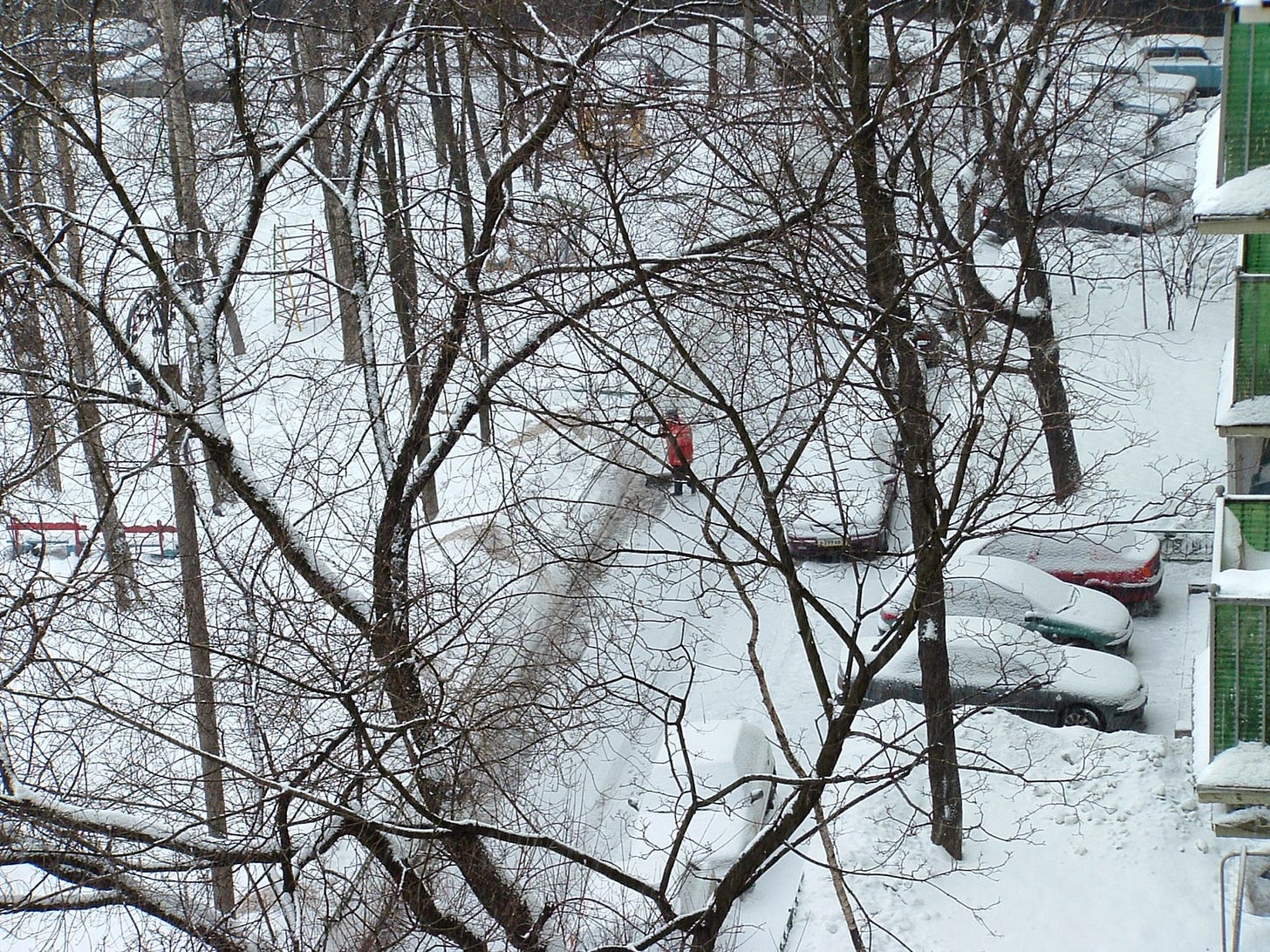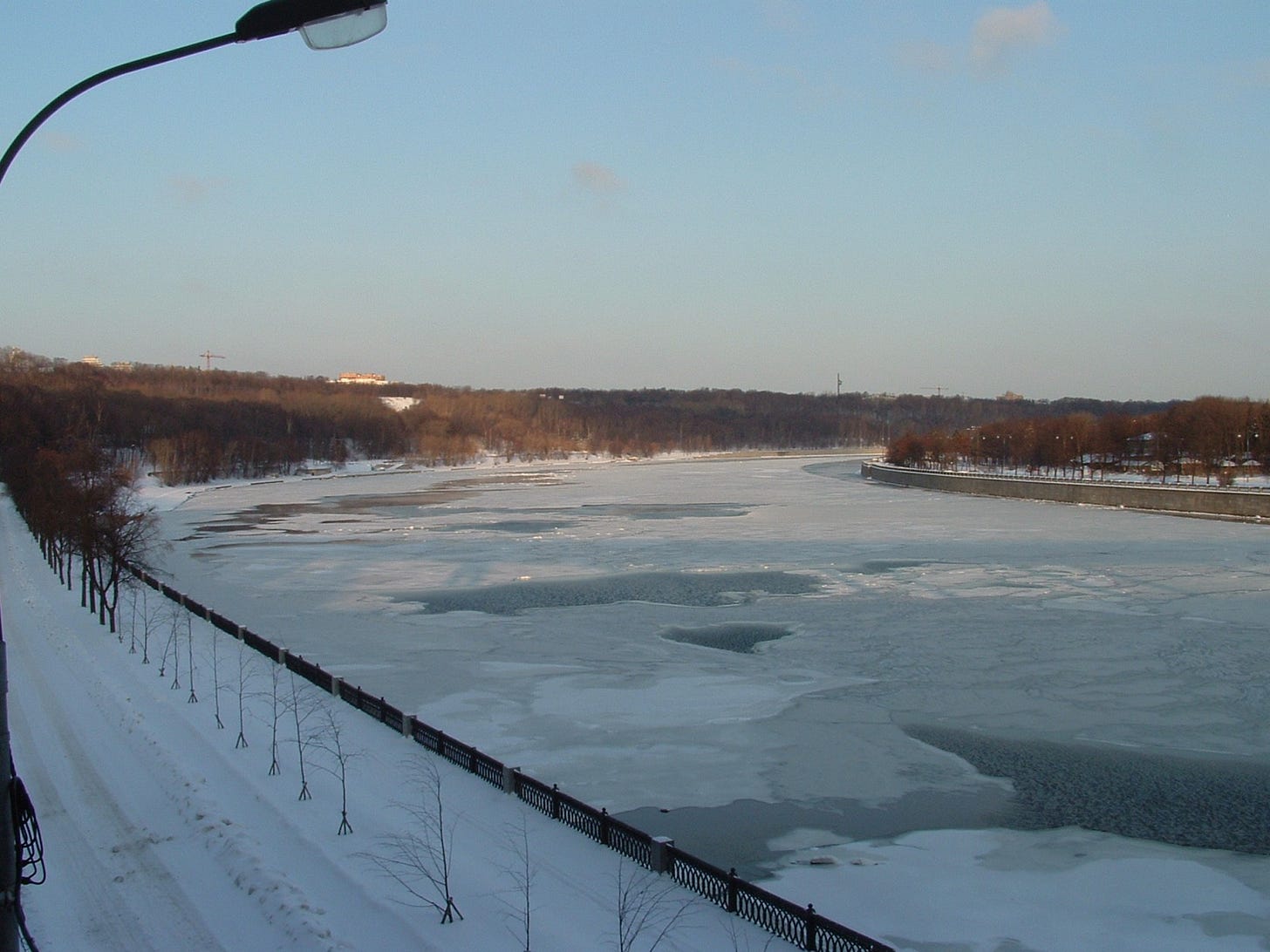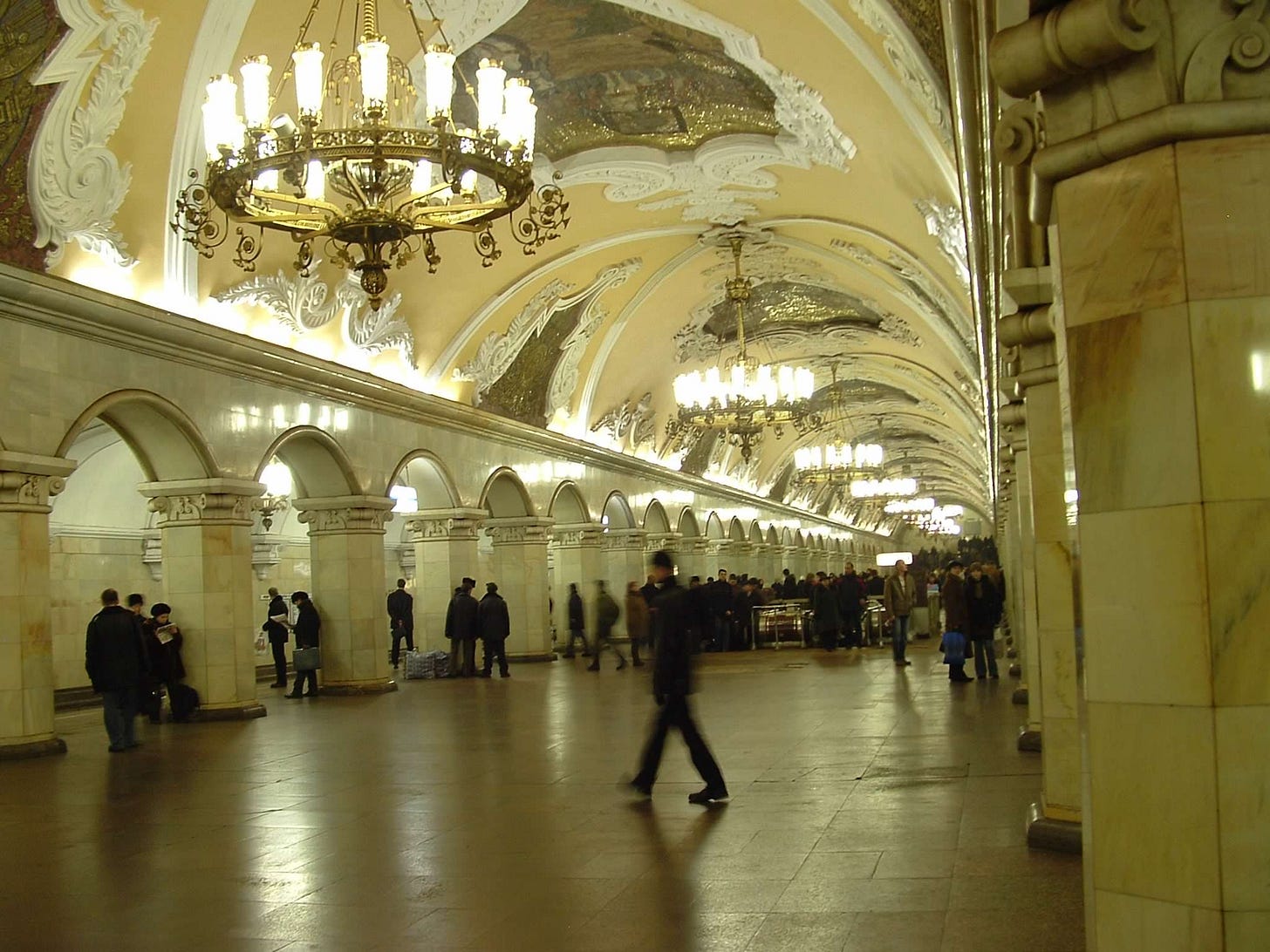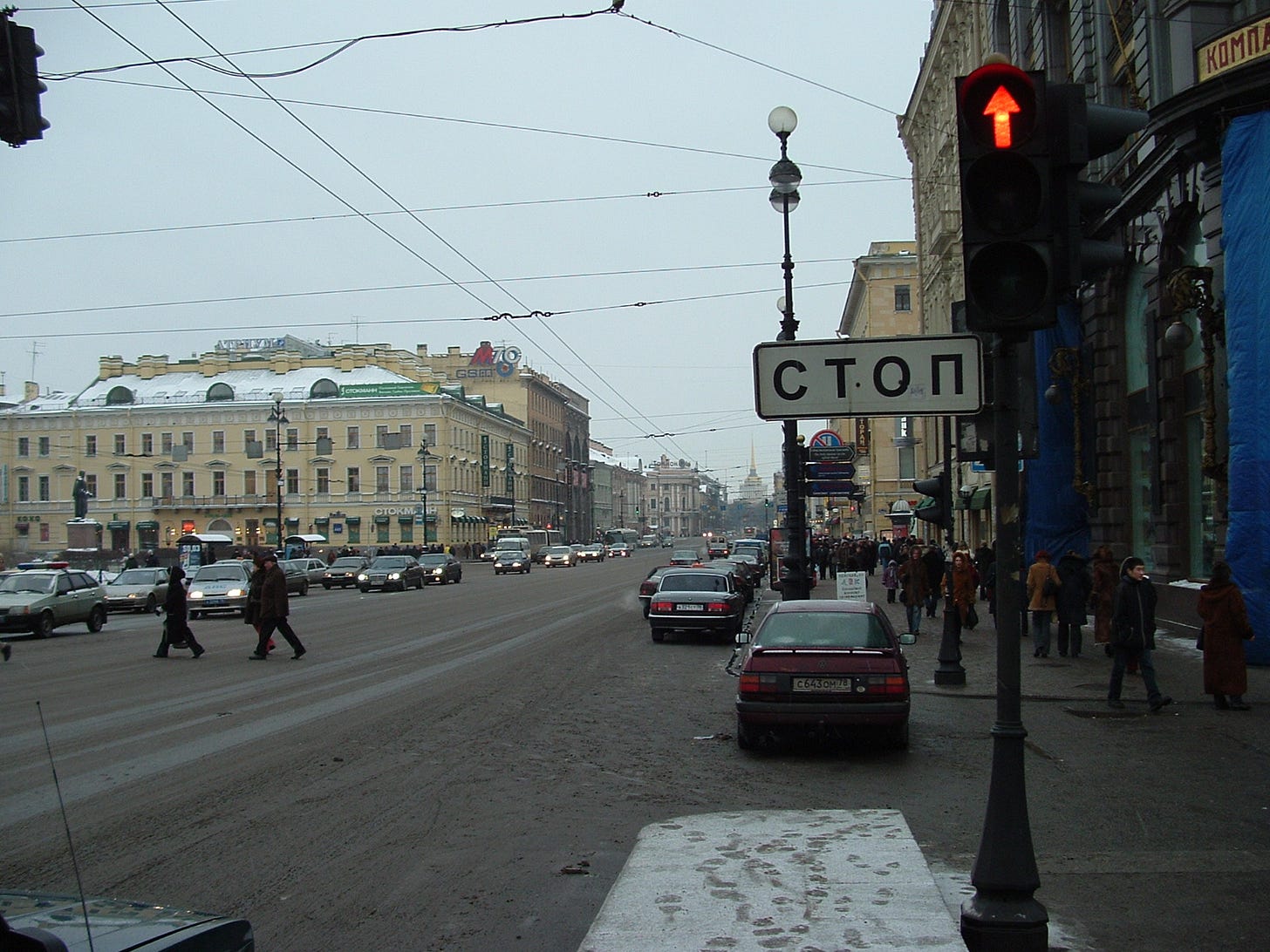Some days ago I was walking through a gas station parking lot holding a bouquet of roses I’d just bought at Safeway. A couple filling up their car gave me one of those double-take long glances that makes you look down at yourself and wonder what caught their attention. Was it the roses? The camo hat? The knitted wrist warmers? The bear spray hanging from the waist? All of them together? I imagine I looked a little odd, walking seemingly nowhere in a place never meant for pedestrians.
It reminded me of this day during a two-month period I spent in Russia taking a language immersion course at Moscow State University. I stayed with my dad and stepmother in their apartment and walked five days a week to the metro, where I took a subway line that would carry me across the river to the university stop, where I could walk another half-hour to my class and afterward to the stolovaya—cafeteria—that still, just as in Soviet times, served mostly slices of hard, dark bread topped with a couple strips of tasteless waxy cheese, or salami, or just plain butter.
I was there in February and March and it snowed every single day. The city’s plows could barely keep up and they’d run out of spaces to dump the plowed snow. Every morning I looked out of the apartment window and saw someone chipping a path through hardened snow and ice on the sidewalk far below, and every day as I walked to the metro through a park I passed an older man who shuffled on the icy path and fed tiny pieces of food to a stray terrier-type dog, smaller and cuter than most of the wild dogs that populated Moscow.

I was reminded of all this because one day after class I took the metro all the way across the city to Komsomolskaya, the station near where my father’s office was. Komsomolskaya is near Leningradsky Station, where you take the train to St. Petersburg-formerly-Leningrad, and behind both of them is a massive network of rail yards and a small metropolis of random businesses planted along the deeply rutted and broken dirt roads.
I was walking toward my father’s office, bundled in a sheepskin coat and a thick scarf and watching my footing on the snow and frozen mud, when I passed a man leaning on a fence. No hat or scarf or gloves despite the sub-zero weather, but holding a bouquet of a dozen brilliant red roses. He smiled at me, gold teeth glinting, and I smiled back, and ever since that day I have wondered what his story was, who the roses were for, why did he look so happy in a region of Moscow where wary and dour were the norm?
It was fun to think that the couple who did a double-take while filling up their car the other day might have had a moment’s conversation afterward—the bear spray and camouflage hat and flowers, what’s the story there? Or maybe they didn’t think more about it. But I liked being reminded of that man and his roses, and how the deep cold of those months still couldn’t erase the smells stamped around a busy train yard. Urine, mostly, though there were plenty of others, almost none of them pleasant. Somehow, despite the urine and the harsh smell of papirosi cigarettes, the memories evoked are still full of roses.
There’s something relieving about that thread of memory, how vivid it is, how the smells still linger and I can still see the man and the way he held the flowers upright, not letting them dangle.
I got my second Covid booster last week, the one that’s meant to cover Omicron (or whatever, I’ve lost track a little); though the previous two shots made me very sick, this one felt closest to having actual Covid, complete with feeling like my skin was trying to crawl away from me, an unpleasant reminder of what an uncomfortably small amount is known about the virus.
I was pretty loopy for several hours afterward, my brain not quite making connections (sorry for the weird texts, friends and family), which would have been fine except that I haven’t, as far as I can tell, fully gotten my brain back since having Covid in February. Having to copy edit textbooks did feel like it helped build up some initial attention resilience and dispel fogginess (all that attention that I have to pay to minute, tedious detail for hours at a time must be good for something, I guess), but things aren’t fully back to “normal.”
I was telling my older sister about my decreased multitasking abilities, especially in the mornings when I’m doing too many things at once—making breakfast, packing lunches, checking for permission slips, feeding the dog, commiserating over forgotten homework while refusing to do people’s problem-solving for them (holding that line takes an absurd amount of patience), reminding people of various schedules, trying to feed myself. Among other things.
My sister, who is smarter than I am, first wanted to remind me that there’s no such thing as multitasking, so I said, yes, I mean task-switching, I’ve just noticed I’m slower at it. Each task wants fuller attention, for longer, than it did before. It’s not a huge change, probably invisible to anyone who is not me. But it’ll kick in when I’m driving sometimes. Watching traffic from a stop sign and realizing that the automaticity that usually accompanies maneuvering a car has disappeared. What am I looking for? A gap in cars. Why? So I can turn right. Why am I going right? To get to Kalispell. And then I turn right and have to remind myself that red lights on the back of the car in front of me means I should step on the brakes. I wish I could take a bus but there is no bus.
I don’t want to overemphasize these effects. They’re not enormous, just noticeable—nothing like some of the brain fog described in Ed Yong’s recent investigation on the problem in The Atlantic. They’re intermittent except during the morning routine and I’ve probably always been trying to do too much during that hour anyway. Still, it’s my brain and I don’t like this small but significant change.
When I was writing my book, I got very interested in embodiment research, the mind-body perspective that rejects Descartes’ dualism, his conviction that the mind and body are separate. In memory and experience in particular, the mind-body connection seems obvious. Marcel Proust famously evoked it in In Search of Lost Time, flooding into the lifetime of memories that followed his taste of a madeleine dipped in tea. He did it again at the end of the book, except this time with the step of a foot on a loose flagstone in Venice:
“All at once, I recognized that Venice which my descriptive efforts and pretended snapshots of memory had failed to recall; the sensation I had once felt on two uneven paving slabs in the baptistry of St. Mark had been given back to me and was linked with all the other sensations of that and other days which had lingered expectant in their place among the series of forgotten years from which a sudden chance imperiously called them forth. So too, the taste of the little madeleine had recalled Cambray.”
That flagstone scene is my favorite part of the book partly because it shows that Proust wasn’t just playing around for the previous three thousand pages or so—that he in fact knew what he was doing—and partly because the description of that mind-body connection is so clear, so visceral, so close to many of my own experiences that I could feel it in the back of my teeth. “Memory and knowledge come from the body,” I wrote of that scene.
“A flavor can send us back to childhood, and a footstep can send signals, like an electric charge, all the way up the legs, sizzling up the spine and to the brain, where they fire neurons of memory and emotion, snapping connections we’ve yet to fully comprehend.”
After I wrote a first draft of this essay in a notebook while sitting in the town library, I went for a walk around town, so happy for the chance to be slow, to not have to rush or task-switch, and greeted trees I haven’t visited for a while, listening to their rustling as their leaves begin to turn to autumn, and thought of how tired so many of us are, how desperate to have the time to slow our thoughts as well as our bodies and the pace of our lives.
And then finally I remembered something that had been nagging me all day, like a loose tooth—the missing item from my grocery list: peanut butter.
To say I was grateful for that thought sounds ridiculous, but it’s true. It was just peanut butter but it was missing and I had the time to wander and meander and let it make its own sweet way back to my mind and onto the list in my purse.
It’s been seventeen years since that Moscow winter when the man and I exchanged smiles over his bright red roses and our frozen breath and the snow-ice-covered ground. What will evoke that memory in another seventeen years? What will I remember then from this time, from the day I walked home with my own flowers, the air thick with wildfire smoke, the road rumbling with trucks and construction, and my mind full of very different thoughts?
I hope something remains. The glance of the couple in the car, the crinkly plastic covering of the flowers, the discomfort of the bear spray on my hip as I walked. Even the way it all reminded me of that winter day in Moscow, the cold in my nose, the wild dogs arguing over food scraps, the trains going east that I always yearned to board. Maybe memory attaches itself to wanderings and meanderings, to actions not taken. To questions unanswered because they were never asked (I will always wonder—why the roses? why the smile?). To a moment whose meaning will always be unknown, a possibility unexplored. To longing.






It's the bear spray. (Rorshach test, all of us? I've never lived in a rural place like Montana).
I love hearing about memories like that, even when there is no deeper point being made. Both the memories, and musings on memory. It's endlessly fascinating. I think aside from the emotions and body component associated with a certain memory, there's often this additional overlay of nostalgia for anything going back more than a few years just by virtue of the fact that it's a part of our life already past and lost. Even if it's not a happy memory, I feel nostalgia simply because it's in the past. So this mixes in with the other visceral emotions, too.
You wondered what will stand out 17 years from now; if the present will turn out as interesting and magical as the distant past seems now. I have often wondered this too. What I do notice is that the episodic memories that survive beyond a few years are not necessarily the ones I might have predicted; rather they seem to be spaced out and cover enough of a variety of experiences to help me keep track of the whole, preserve a running narrative so I don't lose track of my life. It's less about any one memory, and more about how they all support and complement each other. That's my own hypothesis, anyway.
That's a little concerning about your reaction to the shot - might be worth checking some of the better blogs and resources online to see if similar stories are coming up. I'll mention if I hear anything.
I haven't felt like "myself" since my second vaccination a year and a half ago. I haven't gotten any of the boosters because of it. I haven't had Covid, either -- or at least had symptoms or tested positive, despite numerous close contact with infected, symptomatic people. Something's changed in me since the vaccinations, but I don't know what or even how to explain it. There's something so haunting about your imagery in this: the red roses, the Russians and the French. It's a timeless piece, punctuated by our weird time.